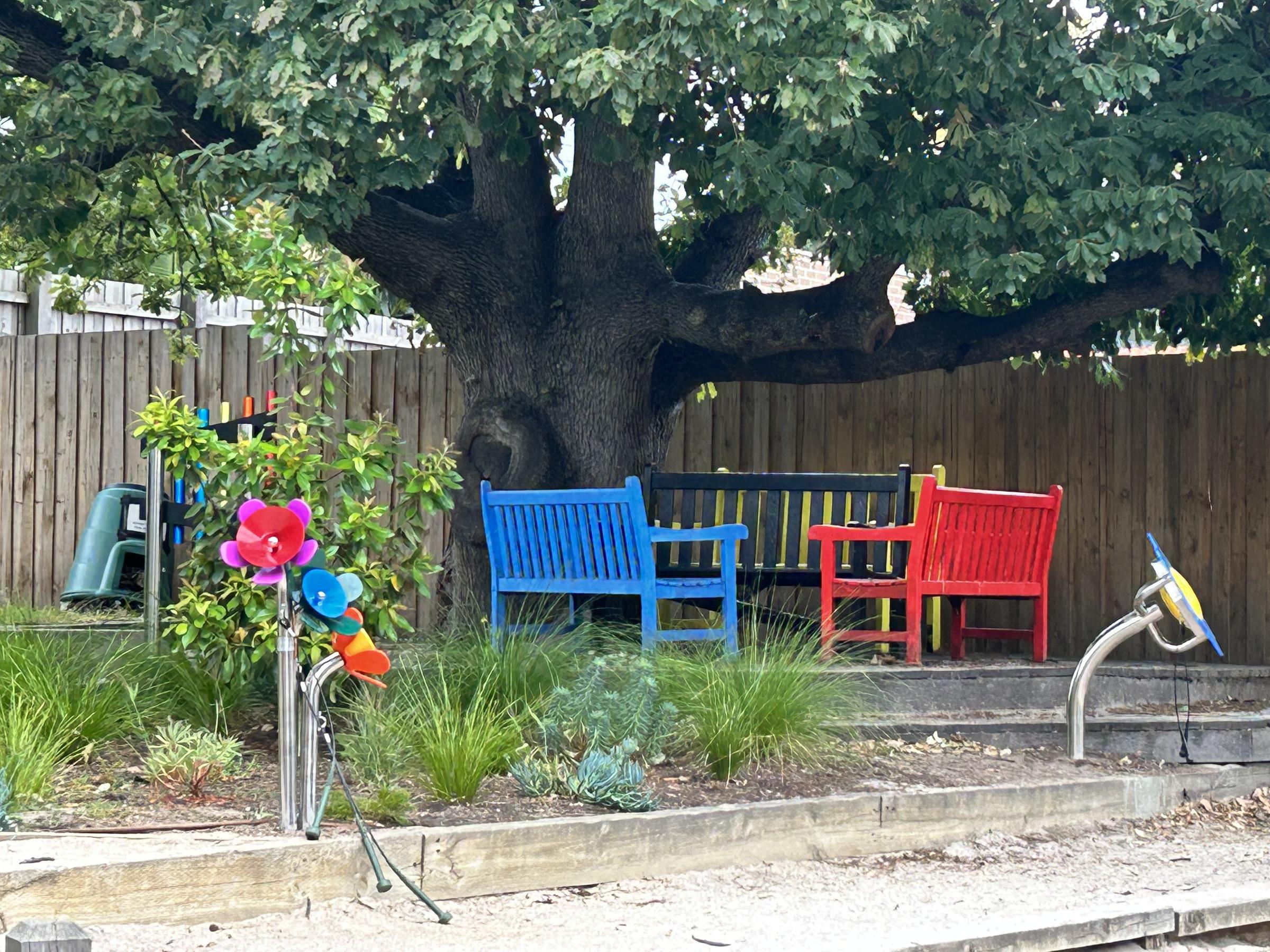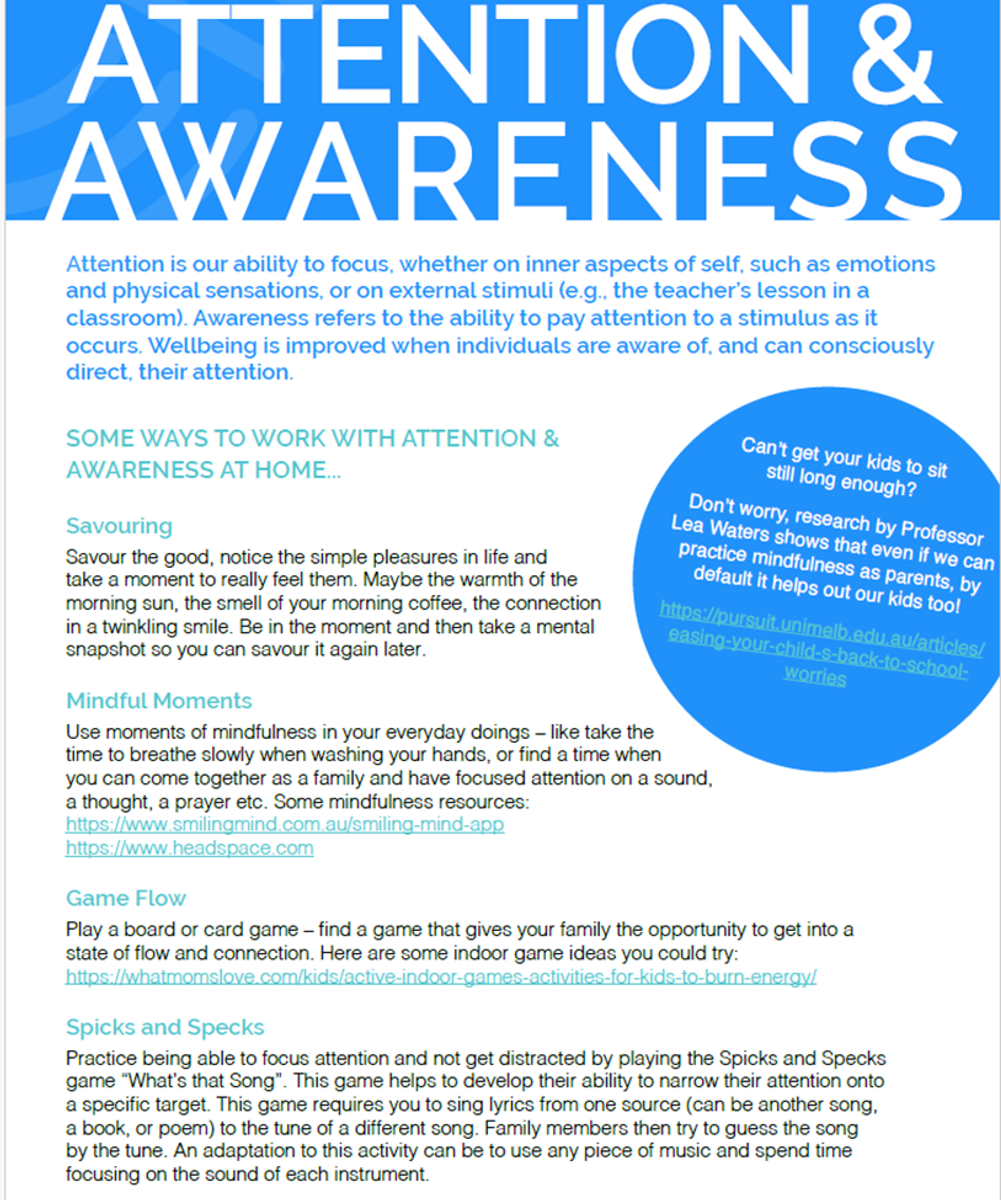Wellbeing

Teaching and Learning - Term 3
Next term our Wellbeing focus will be on Attention and Awareness (VWB) and Positive Gender Relations (RRRR).
Visible Wellbeing
Attention and Awareness: Enhancing the brain’s ability to focus and raising our awareness of self and others to foster learning and innovation.
Attention is our ability to focus, whether on inner aspects of self, such as emotions and physical sensations, or an external stimuli (e.g. the teacher’s lesson in a classroom). Awareness refers to the ability to pay attention to stimuli as it occurs. Wellbeing is improved when individuals are aware of, and can consciously direct, their attention.
Resilience, Rights and Respectful Relationships
The RRRR program is a part of our commitment to the wellbeing and holistic development of every child. It focuses on teaching students about the importance of resilience, understanding their rights, and fostering respectful relationships. The aim is to equip our young learners with the tools they need to navigate life's challenges, build healthy relationships, and contribute positively to our community.
The RRRR program is taught in every Victorian School as mandated by the Education Department. If you have any questions about the program please contact your classroom teacher or Amanda Howe.
Key Components of the Program
The RRRR program covers eight important topics, each designed to help students develop a wide range of social and emotional skills:
- Emotional Literacy: Students learn to understand and express their emotions. This helps them to communicate their feelings effectively and develop empathy for others.
- Personal Strengths: This topic focuses on identifying and building on individual strengths. It encourages students to recognize and use their unique abilities to achieve their goals.
- Positive Coping: Students are taught strategies to manage stress and cope with challenges in a healthy way. This includes problem-solving skills and techniques for staying calm under pressure.
- Problem-Solving: This topic helps students develop critical thinking skills. They learn how to approach problems systematically, consider different solutions, and make informed decisions.
- Stress Management: Students learn about the causes of stress and how it affects their bodies and minds. They practice relaxation techniques and other methods to reduce stress.
- Help-Seeking: This topic emphasizes the importance of seeking help when needed. Students learn how to ask for assistance and identify trusted individuals they can turn to for support.
- Gender and Identity: Students explore concepts related to gender and identity, promoting understanding and respect for diversity. This topic helps to create an inclusive school environment where everyone feels valued.
- Positive Gender Relations: This topic teaches students about respectful relationships and the importance of equality. It encourages positive interactions and helps prevent gender-based violence and discrimination.
Why is RRRR Important?
The skills and values taught in the RRRR program are essential for the overall development of our students. By learning about resilience, rights, and respectful relationships, our students will be better prepared to handle social and emotional challenges, leading to a happier and more harmonious school environment. These lessons also extend beyond the classroom, helping students to become respectful and responsible members of the broader community.
How Will the Program be Implemented?
The RRRR program will be integrated into our wellbeing curriculum and taught through various interactive and engaging activities. Teachers will lead discussions, role-playing exercises, and collaborative projects that align with the program's themes.
Teacher Participation and Professional Learning
To ensure the successful implementation of the RRRR program, our teachers have actively participated in professional learning sessions. These sessions are designed to equip our teachers with the knowledge and skills needed to effectively teach and integrate the RRRR topics into the classroom. By engaging in ongoing professional development, our teachers are prepared to support the delivery of the RRRR program in a sensitive and professional manner.
RRRR - Positive Gender Relations
Learning activities within this topic focus on building an understanding of the effects of gender-based violence and focus on the standards associated with respectful relationships. Students develop the skills needed to solve problems, set boundaries within relationships, and play an active role within the prevention of gender-based violence. They develop peer support and help-seeking skills that can be applied in response to situations involving gender-based violence in family, peer, community or on-line relationships.
Letting Kids Play
With the holidays around the corner, I thought I'd share an article by Dr J Coulson.
Bob Ross had a career in the Air Force for 20 years and didn’t start painting until he retired. At 41, he became everyone’s favourite art teacher.
Colonel Sanders had a hard time holding down jobs, working as a fireman, insurance salesman, and even worked in law. It wasn’t until his 40s that he started successfully selling fried chicken.
Martha Stewart worked as a stockbroker. It wasn’t until she was 41 that she published her first cookbook.
Albert Einstein was expelled from his school, and his teachers thought that he was mentally handicapped. Yet he went on to win a Nobel Prize and is considered one of the most brilliant minds of all time.
Winston Churchill failed 6th grade. At 63, he became Prime Minister of England.
It’s so easy to grow anxious, worried that our children are falling behind or missing out.
We worry that they won’t develop their culinary skills if they don’t start Mummy and Me cooking classes as toddlers.
We fear that they will never be talented artists if we don’t enrol them in the pricey after school art class.
We are concerned that if we don’t require them to practice piano daily, that they will never develop into talented musicians.
We worry that their low score on their maths test means that they will never go into a STEM course at university.
We anxiously watch on as they struggle to decide which subjects to pursue in high school, worried what careers they are precluding themselves from following.
What we often fail to remember in those moments of anxiety and fear, is that learning doesn’t stop when they finish high school or their tertiary education. As adults we can go back at any time and learn to paint, learn to do complex algebra, learn to be good leaders. We can change career paths again and again, and quickly catch up on the things we missed or have forgotten.
What we can’t do is get our childhoods back.
Childhood isn’t a time to prepare to be an adult.
Childhood is a time to be a child.
Childhood is a special time where imaginative play feels richer, where friendships are formed over a shared love of digging for worms, and where building a tree house can feel like the most important thing in the world.
Yet we often cut into that time to get them to sit still, learn ‘important things’, and prepare for their futures. The problem is that the more time that they are engaged in adult-led, structured, future-oriented activities, the less time they have available to engage in the real work of childhood – play.
Play teaches our kids everything that they really need to learn. It fosters physical and motor development. Play requires socio-emotional skills. It strengthens the imagination and creativity. It builds STEM skills and deductive reasoning. Play can not be substituted with other activities and still achieve the same outcomes. Children need the opportunity to play.
To celebrate World Children’s Day, let’s elevate play to its true level of importance. Let’s prioritise it above our own goals for our children. Let’s allow our kids to have a day, at least just this one day, to choose their own activities, to play without direction, to engage in the work of childhood without limits.
And if you can, go even further. Start a 30 day play challenge, making sure your kids have at least 45 minutes every day to engage in activities of their own choice. If it’s been a while since they had the opportunity for free play, they might not know where to begin. To avoid those calls of “I’m bored”, try setting the stage with these play prompts:
- Pull out the bicycles
- Visit a new playground
- Set up a play dough or clay station
- Get out the chalk
- Turn the hose into a sprinkler
- Go to the beach
- Take a few different balls to a park
- Dust off some board games
- Go to the swimming pool
- Get out the paints and paint brushes
- Go out to a nature reserve
- Visit some rock pools
Then get out of the way. True play is self-directed, intrinsically motivated, and creative.

